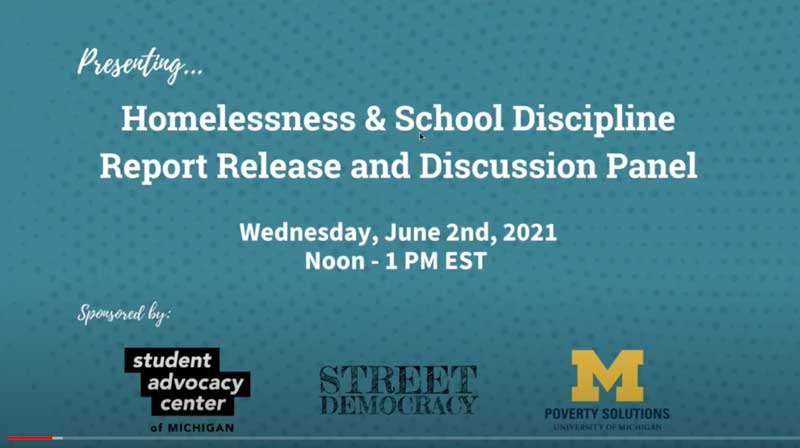By Lilly Kaplan, MSW Student Intern
On June 2nd, 2021, Student Advocacy Center hosted a webinar focused on homelessness and school discipline. The event, which was co-sponsored by Street Democracy and Poverty Solutions, provided an opportunity to learn about brand new research from Poverty Solutions and take part in a dynamic discussion on homelessness and school discipline, an issue that continues to impact our students.
You can watch the entire Homelessness and School Discipline Report Release and Panel Discussion Webinar here.
You can view the policy brief from Poverty Solutions at the University of Michigan here.
Ready to help? Please complete this survey looking at the policy recommendations and let us know your thoughts on the recommendations and if you are willing to help advocate.
Summary
Education is a human right and it is vital to continue to work to remove barriers that prevent students from accessing that right. Jennifer Erb-Downward, senior research associate at Poverty Solutions at the University of Michigan, presented on her recently published report on homelessness and school discipline. Her research found that students who are currently or were formerly homeless are being disproportionately disciplined in public schools and focused on the importance of recognizing trauma when reforming school discipline.
Key Research Findings
- Experiencing greater economic and housing instability is associated with higher rates of disciplinary action.
- Students who were currently housed but had experienced homelessness within the last eight years were disciplined at higher rates than those who were currently homeless — suggesting that the trauma of homelessness persists long after stable housing has been secured.
- Black students and elementary students who experience housing instability are also disproportionately impacted.
Three panelists responded to the research and provided recommendations based on their personal and professional experience. Our panelists included SAC’s own Board Member Brittney Barros, who has lived experience with homelessness, as well as Julie Ratekin, the McKinney-Vento Consortium Coordinator and County Liaison for Wayne County, and Dr. Sarena Shivers, Deputy Executive Director of the Michigan Association of Superintendents and Administrators.
***
Recommendations Explored:
- Adding an 8th factor to the existing 7 factor considerations that requires school districts to consider if the student is currently or has formerly experienced homelessness prior to removal.
Removals for students who have experienced homelessness can have a negative impact in many different aspects of their lives such as, food access, mental health and academic supports. Schools must consider whether the behavior is related to the student’s temporary living status and the barrier to accessing education that removal would create. However, as Dr. Shivers mentioned in the webinar there must also be a level of accountability in regards to disproportionality. “If it’s not on anyone’s radar [then] nobody’s paying attention to how much the African-American boys that are also having some lived homeless experience are getting suspended.” Based on what the data shows, it would need to be followed up by corrective action, she suggested.
- Ending the use of long-term suspensions and expulsions in elementary school (PK-fifth grade) and encouraging the use of developmentally appropriate disciplinary alternatives.
Harsh disciplinary action for young children often results in more harm than good and can reinforce the behavior rather than discourage, creating a pathway for future behavioral issues in school. Ms. Barros highlighted the need to approach policy initiatives with a lens of anti-racism, active awareness and trauma-informed care in order to “create a robust system that enhances the lives of homeless youth.” Reform efforts should focus on creating schools to be a safe place that is stable and secure for those young children who experience homelessness.
- Incorporating training on school discipline, trauma and homelessness for educators in an effort to decriminalize homelessness and understand the implications of trauma and implicit bias that may be brought into the classrooms.
There is a lack of awareness about homelessness and its implications on mental health which create a barrier for students who have experienced homelessness to access the supports that they need. Ms. Ratekin expressed the importance of educators meeting students where they are and developing an awareness of the individual needs of students who have experienced homelessness. Educators should work to understand the reasons and circumstances behind a behavior rather than immediately taking punitive disciplinary action.
Throughout the state of Michigan, we need to create partnerships within communities and school systems to further efforts aimed at reducing disciplinary actions for students who are currently or have formerly experienced homelessness.
